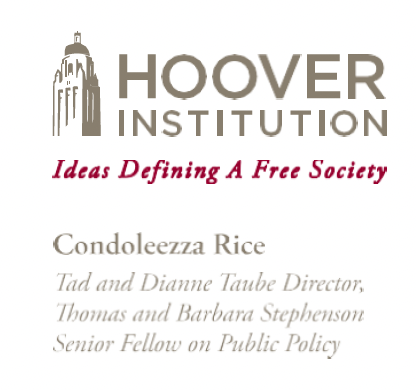Letter From Condoleezza Rice:

Dear Friend,
I write today to express my profound gratitude for your generous support of the Hoover Institution and to provide you with an update on the pivotal work being conducted by our scholars. They are tirelessly conducting groundbreaking research, offering solutions to some of the most pressing policy challenges at this very important time in our nation’s history.
Our nation just concluded a consequential election season. In reflecting on these recent events, we were all fortunate to witness a strong spirit of democracy with large numbers of voters turning out to have their voices heard. As the transfer of power is underway in the coming days and months, it is worth taking a moment to appreciate the strength of our two-century-old institutions and how they have enabled the United States to be free, prosperous, and the greatest democracy on the face of the Earth.
For a policy-oriented research institution, this moment means as much as any other that there is much work to be done. With your help, we are doing everything we can to inform citizens and policy leaders alike as we strive toward a more perfect union.
Under the leadership of Brandice Canes-Wrone, the Center for Revitalizing American Institutions has been stressing the importance of presidential transitions to our future as a democracy. A current series of webinars is exploring various policy dimensions of this issue, including one I participated in with my former White House colleague Stephen Hadley on why an effective changing of the guard is critical to national security matters.
This fall, RAI also published a report, Revitalizing the House, which calls for serious reforms to address the poor health of Congress. As the national political body closest and traditionally most responsive to citizens, improving the House’s operations is another vital concern to our democracy.
A key factor in ensuring the durability of our representative government and system of free enterprise is how we draw lessons from the past, particularly on consequential issues. To this end, the Hoover History Lab, spearheaded by Stephen Kotkin, aims to foster and transfer this vital knowledge to academia, education systems, policy circles, the private sector, and the attentive public.
The lab has enlisted senior fellows within its ranks and is cultivating rising generations of scholars toward its objective. It is not only guiding and encouraging our early-career fellows in publishing their prodigious research, but also mentoring undergraduate and graduate researchers. Through a newly established academy, the lab will be teaching the necessary skills to high school students so that they can bloom into future scholars.
The founding mission of the Hoover Institution is to preserve access to historical records through its Library & Archives. Staying true to our founder’s vision, Eric Wakin and his team have been working assiduously to defend Hoover’s custody of the personal diaries of high-ranking-communist-official-turned-dissident Li Rui, whose writings provide invaluable insights into party politics and key events in modern China, including an eyewitness account of the June 1989 Tiananmen Massacre.
Hoover continues to be an essential resource for understanding China’s ambitions and the threat it poses to democracy worldwide. In September, a Hoover delegation visited Taiwan, meeting with its president and other leading officials, advising where our expertise can inform about the challenges that country is facing from Beijing. This year our colleague Matt Pottinger assembled leading Sino and military experts to release The Boiling Moat: Urgent Steps to Defend Taiwan. In October, we launched a new program, US, China, and the World, directed by Elizabeth Economy and Glenn Tiffert, which provides data-driven analysis and actionable solutions concerning the bilateral US-China relationship.
At our recent fall retreat, I had the pleasure of speaking with NVIDIA CEO Jensen Huang, head of the world’s most valuable company, about the path of generative Al and how American policymakers must respond to ensure artificial intelligence remains beneficial for our society. Further to that effort, I, along with Hoover fellows John Cochrane and Eugene Volokh, contributed to the publication of The Digitalist Papers, an anthology looking at the potentially transformative effects of generative Al on American democracy.
Beyond Al, Hoover is building on the success of the first Stanford Emerging Technology Review with programs to examine the policy implications of other cutting-edge technologies, including synthetic biology. To this end, Stanford bioengineer Drew Endy has joined the Hoover fellowship and is now running our new Bio-Strategies and Leadership research team. The team welcomed congressional research staff to Hoover in October and is generating policy ideas toward stimulating the synthetic biomanufacturing sector here in America.
I am proud to announce Susan McCaw as the new chair of Hoover’s Board of Overseers. Former chair John Kleinheinz has assumed the role as co-vice chair with Bob Grady. To assist in the dissemination of Hoover’s message of free enterprise and limited government, we’ve hired Daniel Bingham as our chief communications and marketing officer. He is leading efforts to expand the reach of our scholars’ research to new audiences, including younger generations.
As I often tell my colleagues, our goal at Hoover is to shed light, not heat, on the pressing issues of the day. Authoritative research conducted by Hoover scholars is illuminating a safer, more responsible path for US policymakers navigating significant challenges. Thank you again for your support, without which this would not be possible.
Sincerely,

Condoleezza Rice
Your tax-deductible gift will help ensure Hoover’s continued impact on the most pressing policy issues: